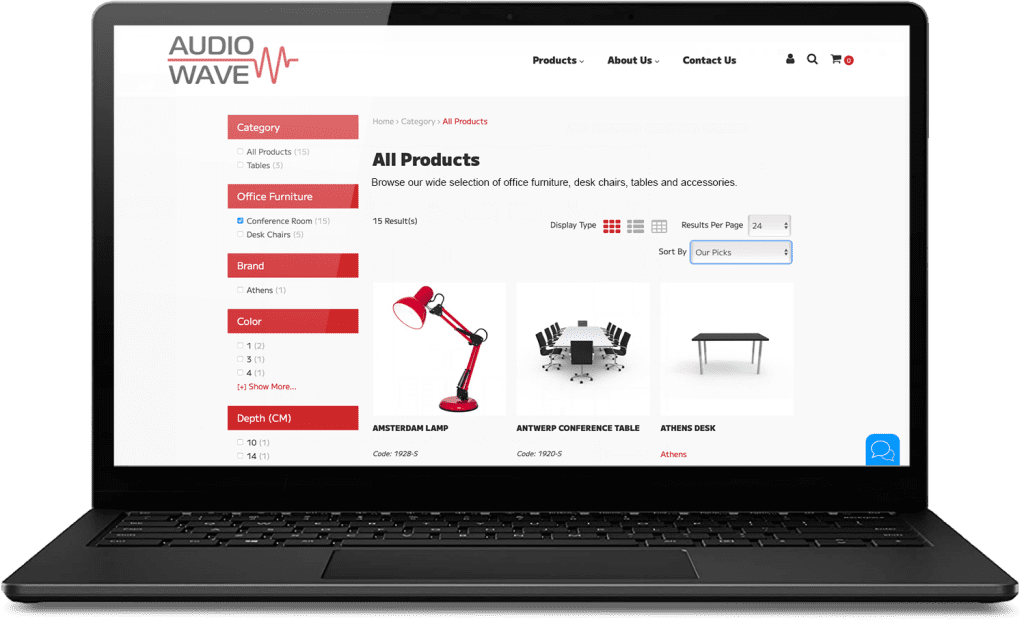
See how B2B trends and buyer needs shape your future in our new eBook.
Create an efficient and secure way to do business
Shorten the sales cycle and benefit from better margins
Personalize your clients shopping experience
Create an efficient and secure way to do business
Shorten the sales cycle and benefit from better margins
Personalize your clients shopping experience

It starts with your ERP.
Explore how you can leave your biggest B2B headaches behind for good.

Today, 7 in 10 B2B buyers see online buying as more convenient and prefer to do so when ready to buy. But only 36% consider their B2B ecommerce experiences to be excellent, which means most B2B websites don’t entice even the most digitally-inclined buyers to purchase.

B2B ecommerce and B2C ecommerce have similarities, but B2B ecommerce demands a much more highly personalized user experience. When you’re looking for a B2B ecommerce solution, what will differentiate it from a B2C platform purchase is the need for unique-to-B2B integration, customization, and features.
Among the top challenges in B2B that call for this tailored approach?
All five of these concerns, however, can be addressed by combining the power of ecommerce and ERP. Think: streamlined operations, better customer experiences, and a single source of truth for all your product, customer, and business data.
With an ERP, all of the tools you need to keep your business up and running are integrated within a single solution (instead of, for example, using one software program to handle your accounting and another to manage your inventory and yet another to analyze customer data).
By hosting and synchronizing these different processes in one cloud-based system, an ERP gives you a comprehensive view of your data and keeps it up to date.
Pairing your ecommerce site with an ERP takes that integration one step further.
ERP integration allows your online store and ERP solution to communicate with each other, so that all activity on your store is automatically synchronized with your back-office operations. With k-ecommerce, that flow of data is bi-directional, and fully secure: never touching, changing, or making installations within your ERP. (All thanks to our powerful, proprietary sync technology).
Together, ERP and B2B ecommerce solutions help automate and simplify business operations, increase productivity, and maximize business growth with ease.
What makes an ideal B2B ecommerce solution? One that makes customer experience excellence the standard.
From streamlined browsing and purchasing, to fast fulfillment, stellar service, and simplified returns, the right B2B ecommerce platform will let you make the ecommerce experience of your buyers’ dreams a reality.
All without compromises, headaches, or data inconsistencies.
To make sure you explore the right ecommerce solutions for your unique-to-B2B needs, it’s helpful to have a checklist of best practices and must-have capabilities to refer back to as needed.
Here’s one that can help.
Whether you’re selling to businesses, or selling direct-to-consumer, your business model shouldn’t be what makes or breaks your ecommerce experience.
To maximize the ROI of your ecommerce investment, it’s critical to offer buyers the features, functionality, and ease of use they truly need. And while selling D2C is a tempting expansion opportunity, businesses need to first master the B2B fundamentals. Then, layering on a D2C experience is a breeze.

To get a strong foundation for your B2B ecommerce experience, you’ll need to:
An effective B2B ecommerce solution simplifies what it takes to launch successful marketing strategies: the key to filling your pipeline with qualified prospects and growing your business.
And while B2C ecommerce marketing focuses on encouraging impulse buys through one-off purchases and shorter sales cycles, B2B marketing addresses businesses’ practical requirements and involves longer sales cycles with multiple negotiation stages.
B2B customers can be a tough crowd. But you can encourage them to visit and even purchase from your B2B ecommerce website by implementing proven marketing strategies like:
Whether it’s SEO, email marketing, or even abandoned cart notifications, a B2B ecommerce solution like k-ecommerce has all the tools you need to stay one step ahead of the competition.
With k-ecommerce, you can scale your B2B operations with confidence: never having to sacrifice your margins, your ways of working, or your performance. (Yes, even if you’re switching or between ERP systems.)
That’s the k-ecommerce promise.


"We didn’t want the typical web store layout. We wanted more of a product listing, with standard order quantities and customer-specific pricing, where they could quickly key in and submit their order."
David Harris
President, John R. White

"The most valuable benefit is the time saved in keying large orders, also the instantaneous update of product information from our ERP system.” "
Kristen Scott
Director of Marketing, Yerecic Label
